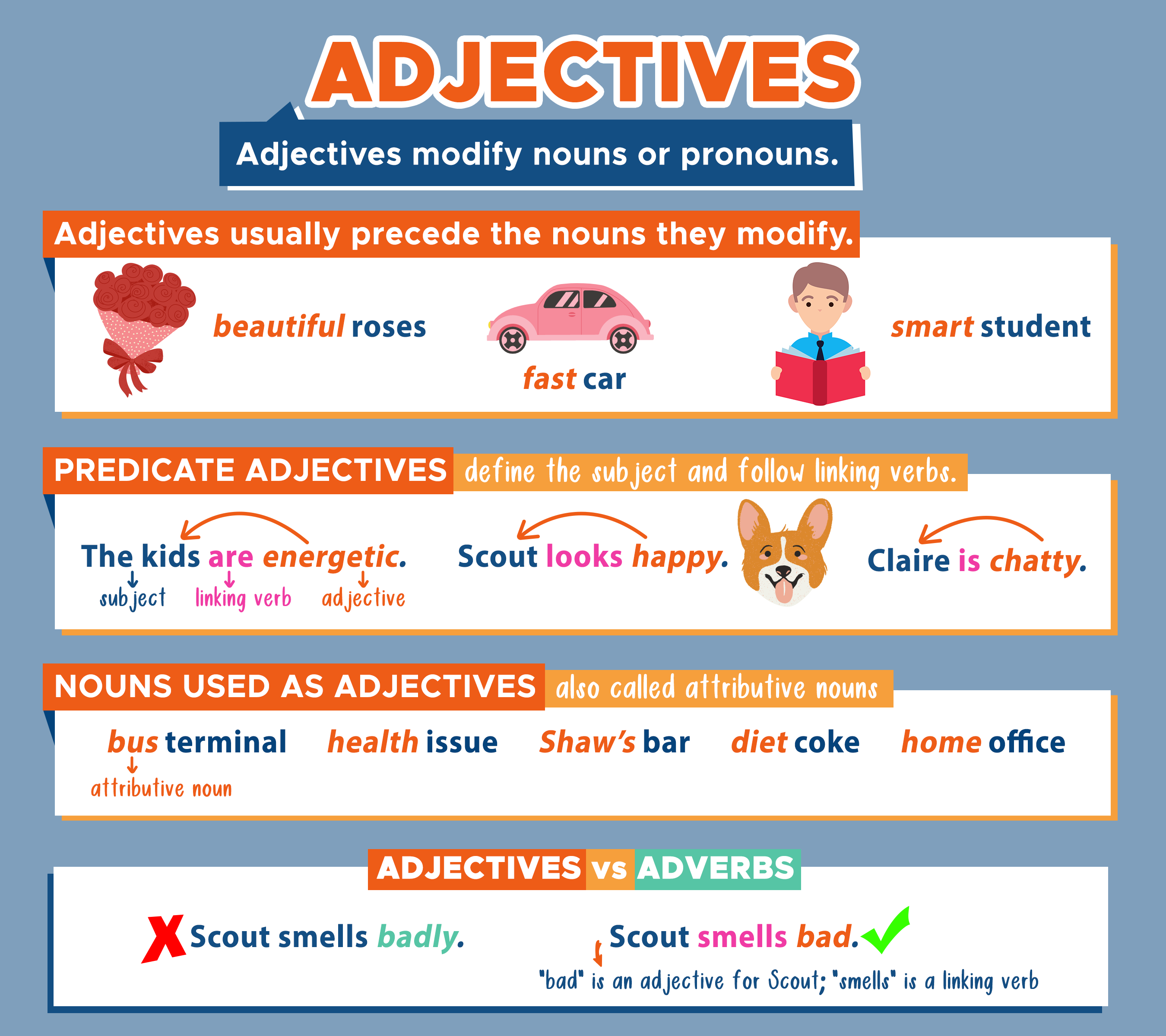Most times, nouns alone cannot encapsulate the intensity of our feelings, experiences, or thoughts. “A devastating storm” sounds more definite than “a storm.” We use adjectives (enormous, gigantic, slow, pink, insane, childlike, dull, excellent) to describe nouns or pronouns. The tiny words a, an, and the, also called articles or determiners, are the most frequently used adjectives. Remember that adjectives do not modify verbs, adverbs, or other adjectives.

Uses of Adjectives:
Adjectives express the qualities and attributes of nouns. In general, they answer the following questions: What kind? Which one? How much or how many? Here are some sentences with the adjectives in bold and modified nouns italicized:
- Andrea is a passionate filmmaker. [What kind of filmmaker is Andrea? Passionate]
- That advice suits you well. [Which advice? That]
- We’re allowed only five absences in her class. [How many absences? Five]
- They had no chance of winning. [How much chance? None/No chance]
- All supplies went missing. [How many supplies? All]
- A suspicious man peers through my window. [What kind of man? Suspicious]
- I admire her fearless journalism. [What kind of journalism? Fearless]
Adjectives usually precede the nouns they modify, like in the examples above and almost every time we use them: lovely dress, inclement weather, stressful day, incredible friend, fast car, loud neighbor. But adjectives don’t only define nouns; they appear after linking verbs.
Predicate Adjectives and Linking Verbs:
As a subject complement, a predicate adjective defines (or refers to) the subject and follows linking verbs. Recall that linking verbs are forms of the verb “to be” such as is, will, am, are, have, etc., and sensory verbs like feel, seem, smell, sound, look, taste, appear, etc.
- Paulyne looks refreshed and motivated. [Refreshed and motivated are predicate adjectives modifying the subject Paulyne. The linking verb looks connects them.]
- Nikki was furious. [Predicate adjective: furious; subject: Nikki; linking verb: was]
- I feel awful. [Predicate adjective: awful; subject: I; linking verb: feel]
- Death is inevitable. [Predicate adjective: inevitable; subject: death; linking verb: is]
- The clouds suddenly turned gray. [Predicate adjective: gray; subject: The clouds; linking verb: tuned]
NOTE: Common mistakes occur when linking verbs such as sensory verbs are followed by adverbs instead of predicate adjectives. Here’s an example: Kate looks badly.
Here, looks is used as an action verb modified by the adverb badly, which implies that Kate looks at things in a bad manner. If that’s what you mean, you can reconstruct the sentence and say, “Kate glared at him.” If you want to tell Kate appears unwell and in need of medical assistance, the correct sentence is “Kate looks bad.” Here, looks acts as a linking verb to the subject Kate and the predicate adjective bad.
Here’s another example. Notice the difference between an adverb and predicate adjective:
WRONG: The cake tastes badly. [This infers that the cake has a bad sense of taste. Thus, the use of the adverb badly does not make sense.]
CORRECT: The cake tastes bad. [The predicate adjective bad and the subject cake are connected by the linking verb tastes. This sentence tells a negative review of the cake.]
Related Reading: Linking Verbs & Subject Complements
Attributive Nouns and Adjectives as Nouns:
Fluid and ever-changing, English allows words to change functions. Just as how verbs can be adjectives (verb: she loved; adjective: she is loved), nouns can be adjectives, too. Here are some examples:
- childhood dream
- bus ride
- amusement park
- Jon’s laptop
- leather jacket
- airplane mode
- fairytale wedding
- remote area
- city lights
Nouns acting as adjectives are also called attributive nouns. They always precede the nouns they modify, but when used with real adjectives, the real adjectives should come first. Here are examples of attributive nouns (in bold) preceded by real adjectives (italicized):
- strict health protocols
- tedious Science project
- three-year road trip
- expensive plane tickets
Adjectives can also function as nouns, especially when we refer to certain groups of people.
- Corrupt politicians take advantage of the poor.
- Minors are not allowed outside after 6 pm.
- The meek shall inherit the Earth.
Exercise:
In each of the following sentences, make a list of the adjectives and the nouns they modify. Don’t include a, an, or the in your answers.
EXAMPLE: We visited the old house and retrieved some childhood photos.
Adjective: old; Noun: house
Adjective: some; Noun: photos
Adjective: childhood; Noun: photos
- The young intern wrote a sloppy report on Tiktok trends.
- Beatrice looks happy about Rob’s output.
- Health experts recommend an 8-hour sleep and 2-liter water intake a day.
- Kind and considerate, the professor explained every mistake in our thesis proposal and gave us ample time for revisions.
- During the Christmas season, Mia travels for two long days to see her beloved family in the province.
Answers:
- The young intern wrote a sloppy report on Tiktok trends.
Adjective: young; Noun: intern
Adjective: sloppy; Noun: report
Adjective: Tiktok; Noun: trends
- Beatrice looks happy about Rob’s output.
Adjective: happy; Noun: Beatrice
Adjective: Rob; Noun: output
- Health experts recommend an 8-hour sleep and 2-liter water intake a day.
Adjective: health; Noun: experts
Adjective: 8-hour; Noun: sleep
Adjective: 2-liter; Noun: water
Adjective: water; Noun: intake
- Kind and considerate, the professor explained every mistake in our thesis proposal and gave us ample time for revisions.
Adjectives: Kind, considerate; Noun: the professor
Adjective: every; Noun: mistake
Adjective: thesis; Noun: proposal
Adjective: ample; Noun: time
- During the Christmas season, Mia travels for two long days to see her beloved family in the province.
Adjective: Christmas; Noun: season
Adjectives: two, long; Noun: days
Adjective: beloved; Noun: family
Thank you for reading. We hope it’s effective! Always feel free to revisit this page if you ever have any questions about adjectives.

